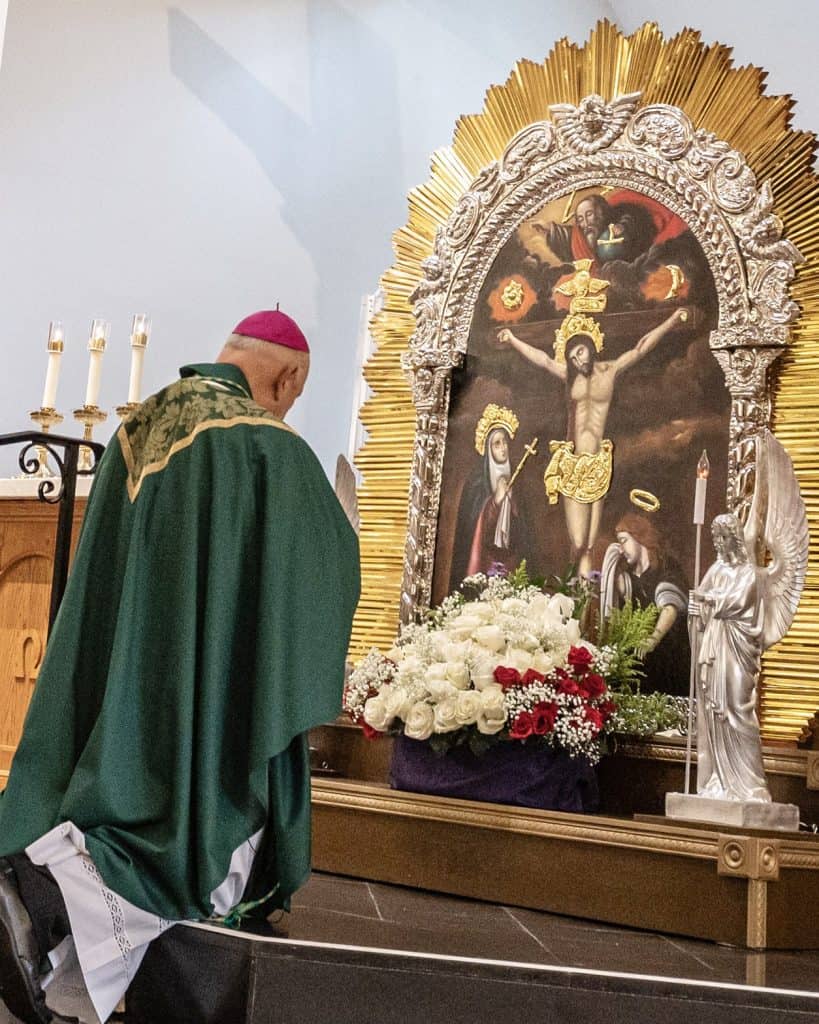
GAITHERSBURG, Md. (CNS) — The plight of millions of migrants and refugees fleeing their homes around the world, especially during the pandemic, is a “human drama” that should cause people to heed Pope Francis’ call and move from “a culture of indifference to a culture of solidarity.”
This was the message Auxiliary Bishop Mario E. Dorsonville of Washington shared at a Mass he celebrated to mark the World Day of Migrants and Refugees Sept. 27, a day designated by the Vatican. The theme for the 106th observance of this day was “Forced Like Jesus Christ to Flee.”
Bishop Dorsonville, chairman of the U.S. Conference of Catholic Bishops’ Committee on Migration, said the Mass in Spanish and English at St. John Neumann Church in the Washington suburb of Gaithersburg. Msgr. Robert Panke, the pastor, concelebrated.
The Mass, which was livestreamed via the parish’s YouTube channel, also commemorated the feast of El Señor de los Milagros (Lord of Miracles), a special devotion for the Peruvian community.
“This is a time for us to pray for migrants and refugees, because in many ways they are the suffering face of Jesus Christ. … Help us to recognize your suffering face in the lives and faces of our dear immigrant community around the world,” said Bishop Dorsonville.
He echoed a point the pope made in his statement for the 2020 observance: “If we can recognize him (Jesus) in those faces, we will be the ones to thank him for having been able to meet, love and serve him in them.”
In his homily at the Mass, Bishop Dorsonville likewise emphasized the humanity of migrants and refugees, and the challenges that immigrants face adjusting to a new country, especially now during the pandemic.
According to the U.N. High Commissioner for Refugees, at least 79.5 million people around the world have been forced to flee their homes in 2020. Among them are nearly 26 million refugees, around half of whom are under 18.
Nearly 46 million people are internally displaced within the borders of their own countries due to armed conflict, violence, human rights violations or natural or man-made disasters.
Most of Massgoers were Spanish-speaking members of the parish, including many families with small children. Following pandemic health and safety protocols, they all wore face masks and sat in pews or chairs, either together as families or socially distanced from each other.
“We as immigrants know how difficult it is to leave the land where we were born,” said Bishop Dorsonville, a native of Colombia, who served as a priest in the Archdiocese of Washington and in 2015 was named an auxiliary bishop.
Bishop Dorsonville said it is important to recognize and value what immigrants bring to a country. “We came here to serve the culture, to help the economy, to build up the families, to bring moral values and the Christian faith,” he said.
The bishop noted the just as they wear face masks to protect family and friends from the spread of COVID-19, people should likewise pray for and open their arms to those who are suffering the health and economic impacts of the pandemic.
During his homily, Bishop Dorsonville stood and spoke near a replica of the image of the Lord of the Miracles — a painting of the crucified Christ that for more than 300 years has been associated with miracles and venerated with massive processions in Lima, Peru.
Some Peruvian immigrants in the congregation, including adults and children, wore the traditional purple robes associated with that devotion After Communion, Bishop Dorsonville knelt and prayed before the image.
In his homily, he commended the world’s suffering migrants and refugees, and this nation’s immigrants, to Señor de los Milagros.
Too often this nation’s millions of immigrants are “voiceless and faceless” to others, the bishop said, yet during the pandemic, many have been on the front lines, serving in hospitals, working on farms, packing food, working in service industries and constructing buildings.
The country hasn’t stopped during the pandemic, because those immigrants love working and have continued to put themselves at risk, “not only for their families, but for the good of this country,” he said.
“May the Lord give us the wisdom to move from indifference to solidarity, to promote a world of justice that will bring us the peace that is so necessary to develop the future generations of this world, he said.









